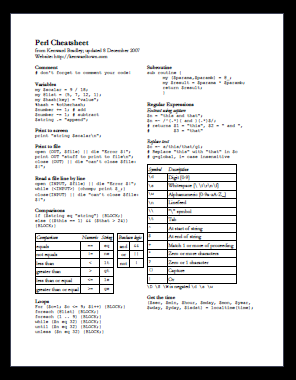
I created this Perl Cheatsheet for myself a while ago, and recently found it again. I cleaned it up and posted it here in hopes that it might be useful to someone. It consists of brief code examples of common usage (for me), broken up into different sections. It’s in PDF format. [Updated May 24th, 2008]
Category: Scripts
Tarot Plot Generator – Abulafia Random Generators
I’ve mentioned Abulafia Random Generators before. Well I’ve created one: Tarot Plot Generator as a writing tool, to inspire myself with plot ideas, using the symbolism of the tarot. It details the main character and three acts with fourteen cards.
Here is an example, continued after “More”…
Main Character
Description: (Reversed) PENTACLES Knight.–An useful man; useful discoveries. Reversed: A brave man out of employment.
Past: (Reversed) CUPS Ace.–Inflexible will, unalterable law. Reversed: Unexpected change of position.
Wants: (Reversed) WANDS Knight.–A bad card; according to some readings, alienation. Reversed: For a woman, marriage, but probably frustrated.
Strength: WANDS Page.–Young man of family in search of young lady. Reversed: Bad news.
Weakness: 8. FORTITUDE.–Power, energy, action, courage, magnanimity; also complete success and honours. Reversed: Despotism, abuse if power, weakness, discord, sometimes even disgrace.
Obstacle to “wants”: CUPS Two.–Favourable in things of pleasure and business, as well as love; also wealth and honour. Reversed: Passion.
Continue reading “Tarot Plot Generator – Abulafia Random Generators”
Plot Keyword Oracle – Abulafia Random Generators
I am obsessed with Random Generators, and have been for awhile. I like the idea that a program with some algorithms and data can create something (seemingly) new. Like the Postmodern Essay Generator or the Random Slashdot Story Generator or a Random Haiku Generator.
I’ve wanted to use generators as inspiration for writing and have found the Plot Keyword Oracle at Abulafia Random Generators. Albulafia is a wiki that allows you to pretty easily create random text generators. A lot of it is geared towards Role playing games (a la Dungeons and Dragons), but I lot of it will work as inspiration for writers of all kinds. For the Plot Keyword Oracle, Robert Donoghue extracted 32,000 keywords from the Internet Movie Database and the Plot Keyword Oracle presents you with 10 keywords randomly pulled from the list. For example in one run I got:
- Collection Agent
- Homing Device
- Wedding Industry
- Nuclear Winter
- Martin Luther King
- Pool Hustler
- Urban Planning
- Deputy Dawg
- Uncle Tom’s Cabin
- Dresden Germany
Wow! That would be one hell of a story!
Podcastamatic v1.3 released
Podcastamatic automates the creation of a webpage and a RSS feed for your podcast, based on MP3 tags. A webpage can either be automatically generated from scratch or generated from a template you create. Podcastamatic is highly customizable.
The new Podcastamatic release (v1.3) supports iTunes tags and now reads mp4/m4a/m4p in addition to mp3 audio files. Get it here.
Changes
v1.3
- Added support for MP4 (mp4, m4a, m4p) files. Requires Perl module “MP4::Info”.
- Added support for iTunes “Explicit” tag. If you are using iTunes support you must now configure “iTunesExplicit” as “yes”, “no”, or “undefined”.
- Added support for different sort orders.
- If there is no MP3/MP4 “Title” tag then the filename is now used (was blank).
- Fixed warning if there is no tag field is empty.
Converting RAM (streaming Real audio) to MP3
What is RAM2MP3?
RAM2MP3 is a command line script (for Windows PC) that helps convert Real Media streams to MP3, so you can listen to the converted audio anywhere you can listed to MP3s, for example on your iPod. It is really just a short script that ties together 2 programs, Mplayer (to download the Real Audio to your PC) and LAME (to convert the audio to an MP3). (Please note I am not taking credit for writing this software, I am merely tying together 2 packages and simplyfing the conversion process with a small script.)
Continue reading “Converting RAM (streaming Real audio) to MP3”
Podcastamatic 1.0
Podcastamatic 1.0, my podcast automation program, has been released. Get it here. This version is a lot easier to get started with and more customizable.
Changes for v1.0
- Simplified configuration.
- Improved customization options.
- Added log file generation.
- Cleaned up internal code.
Podcastamatic v0.3 released
Get it here. Introduced HTML template feature and several bug fixes. Output now highly customizable.
Changes
- Thanks to Craig Meyer for Mac OSX instructions to install MP3::Info.
- Fixed XML description tag; now validates at http://feedvalidator.org/ Thanks to Ed at NIMIQ and Victor Cosby for their help in this.
- added “header” CSS id to HTML output
- new configuration item to HTML output: AdditionalHTML (optional) allows you to add additional HTML code to the generated HTML file
- added “generated by” tagline to HTML output, uses CSS “classgeneratedby”
- Made “No audio files found” error more verbose (thanks to Brian Hefferan)
- Encodes spaces in URLs correctly (urlencode routine thanks to Brian Hefferan)
- Tweaked HTML output so it is now valid HTML 4.01 Strict. Validates at http://validator.w3.org/
- Added “Templates” feature. Added config items “UseTemplateForHTML” and “TemplateFile”. See docs for usage.
BuzzPerl 0.3 released
 BuzzPerl 0.3 has been released and is available for download at Sourceforge. BuzzPerl is a Perl module used to read, write, and manipulate Jeskola Buzz files from Perl. (Jeskola Buzz is a high quality free modular music sequencer and synthesizer software for Win32.) Intended use is for algorithmic music composition, but could be used by anyone who wants to compose music from Perl.
BuzzPerl 0.3 has been released and is available for download at Sourceforge. BuzzPerl is a Perl module used to read, write, and manipulate Jeskola Buzz files from Perl. (Jeskola Buzz is a high quality free modular music sequencer and synthesizer software for Win32.) Intended use is for algorithmic music composition, but could be used by anyone who wants to compose music from Perl.
Continue reading “BuzzPerl 0.3 released”
BuzzPerl 0.2 released
 BuzzPerl 0.2 has been released and is available for download at Sourceforge. BuzzPerl is used to read, write, and manipulate Jeskola Buzz files from Perl. (Jeskola Buzz is a high quality free modular music sequencer and synthesizer software for Win32.) Intended use is for algorithmic music composition, but could be used by anyone who wants to compose music from Perl.
BuzzPerl 0.2 has been released and is available for download at Sourceforge. BuzzPerl is used to read, write, and manipulate Jeskola Buzz files from Perl. (Jeskola Buzz is a high quality free modular music sequencer and synthesizer software for Win32.) Intended use is for algorithmic music composition, but could be used by anyone who wants to compose music from Perl.
Continue reading “BuzzPerl 0.2 released”
